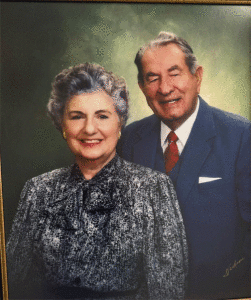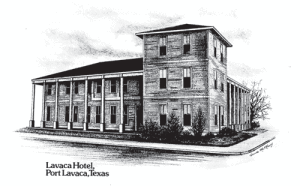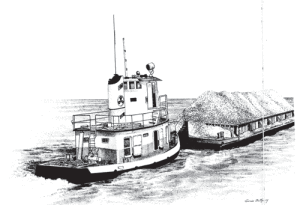
W.H. Bauer and his wife Louise constituted the head of the most benevolent couple and family in Calhoun County, renowned for their love of their family, city, county, state, and country, as well as the world. The Bauers used their considerable wealth that accrued to the many exploits of W.H. (Bill) Bauer for the betterment of all. They were responsible for improvements like the Bauer Community Center, which serves as a venue for family events, weddings, conventions, city gatherings, and many other celebrations. At one time they contributed financially to the construction of the VFW Post Building. They were also responsible for building the Bauer Exhibit Building at the county fairgrounds which also hosts events related to the county fair, an activity that touches so many of the county’s citizens, especially school children. In addition, they also created the W.H. and Louise Bauer Charitable Trust to benefit many varied projects. In addition, they created the Our Lady of the Gulf School along with Father Dan Morales to nurture the grown of Catholic education in the community.
Mr. Bauer also was a benevolent owner of a major business such as Bauer Dredging in that he paid his employees’ hospital bills and even funeral expenses, acts of kindness of which many people are not aware. Being charitable was second nature to Louise and Bill in many other ways too.
Bill Bauer’s legacy rests on the qualities and abilities he demonstrated throughout his life, beginning with his helping his brother Jim to run the Lavaca Hotel, owned by their parents. The boys strove to increase the Lavaca’s business by competing with the other hotel in town, the Navidad; they would meet Old Salty, the train, and approach newcomers, offering to carry their luggage for a fee. Although Port Lavaca was small, numbering only 1,200 people at the time, it was a large oyster port and the boys were busy in their parents’ business, helping to make it a success. The Lavaca became a commercial center, a dance place, and a gathering place for a host of notable celebrities such as governors of the state when they were serving.
At an early age, Bill’s success was based on his sticking to task and increasing his business by creative thinking. He at one time had a kite shop, and then a business featuring new and renovated bicycles, which were displayed in the hotel itself. Facing competition and winning was always a facet of Bill’s character.
Another legacy of Bill Bauer’s rise as a businessman was the knack for seizing an opportunity. For instance, after graduating from high school, Bill was awarded an appointment to the U.S. Naval Academy but, before departing, he happened to stop in at an automobile auction where he bought several autos with money he had saved for prep school. Bauer said that move changed his life and was an education in itself. From this experience he established himself as an astute businessman, one who would achieve prominence as leader in the dredging industry as well as other major endeavors.
Before his success as a tycoon in the dredging business, Bill Bauer had found another venture when he was appointed deputy game commissioner by Governor Ross Sterling. Bauer himself referred to those years as a game commissioner as one of the formative years of his life, one in which he learned to be cognizant of the conservation of natural resources, a passion he showed all through his career and which would prove to be boon to the coastal development. Through his patrolling of waterways, he also appreciated the history of the region, as well as the need for conservation. He also learned to engage with successful men who were prominent and from whom he could discern their path to success.
Bill Bauer was always ready for his next venture which was the establishment of Bauer Dredging, originally Bauer Smith Dredging to acknowledge the partnership between Bauer and his brother-in-law Harry Smith. In the early 1960s the company became Bauer Dredging when Harry Smith was bought out by Bauer. In the partnership, Smith’s mechanical expertise was a valuable asset to the company, and the two made a formidable team as they and the company rose to prominence. Once again Bauer was in his businessman mode as he guided the company to success, making it eventually a recognized world leader in its field. From its beginning in 1936 through 1965, Bill Bauer was Chairman of the Board and Chief Executive Office of the company. In the coming years, he garnered world recognition through his association with organizations such as the World Dredging Association in 1970, an honor from an international organization based in the Netherlands.
The creation of Bauer-Smith Dredging as a force in the world began with a $750 purchase of a small dredge that he had noticed in Freeport. The dredge, christened the Texana, had a capacity of 120 horsepower but it was the cornerstone of a fleet of dredges which brought fame and fortune to the company. The purchase set in motion what became a worldwide dredging phenomenon. It was indicative of Bauer’s legacy of hard work and creative thinking to make Bauer Dredging a force in that industry. These qualities, along with making him well versed in those matters and, even earlier than that, in accompanied his father to meetings of organizations with that aim. Eventually, he served as a director of the Gulf Intracoastal Canal Association for thirty years. His legacy includes that determination to make the inland waterways viable and a boon to the economy of the coast. That legacy is central to Bauer’s achievement in making the Intracoastal Waterway located along the Gulf Coast of the United States a navigable waterway running approximately 1,300 miles from Saint Marks, Florida to Brownsville, Texas.
Another part of Bill Bauer’s vision for the future of his community was evident also in his determination to bring to the Calhoun County area the first large industry when he was the driving force behind the effort to bring the Aluminum Company of America (ALCOA) to Point Comfort. The company had been courted by many cities along the coast but Bauer’s characteristic determination and hard work made sure that ALCOA located its first natural gas-powered smelting plant to Calhoun County. This vision for the future of the the western Gulf coast was transformative for the area, confirming Bauer’s faith in his community and its interests. Mr. Bauer was a president of the Port Lavaca Chamber of Commerce for many years, always trying to better the community in ways like this.
Bill Bauer’s legacy includes another facet, one on recognizing the importance of banking and continuing his penchant for innovation. When he bought First State Bank, he instituted financial services not heretofore used. For instance, he financed shrimp boats and shrimp processing firms. Thus the community and the bank profited so that the bank became the bank of choice for many outside Calhoun County.
After his connection to First State Bank ended in the late 1960s, Bauer gained control of First National Bank, eventually establishing an additional bank, the Seaport Bank which served the communities of Seadrift and Port O’Connor. He was Chairman of the Board there too.
Besides working to better the financial resources of the county, Mr. Bauer was intent on education. In 1965,he was appointed to the Board of Regents of the University of Texas System by John Connally. As a regent, Bauer believed that the role of the regents was the promulgation of policy, not the running of the school, a function that should be performed by the administration. In his capacity as a regent of the UT System, he saw many students attain a college education. Furthering college educations for the students of the state was one of Mr. Bauer’s passions and a prime feature of his legacy for future generations.
When W.H. Bauer sold Bauer Dridging in 1966, he bought the ranch in Jackson County that had historically been in the families of Lafayette Ward, who had brought unique breeds of cattle to the area. The ranch itself and businesses in Jackson County benefitted from the transaction from the sale to Bauer. The ranch also demonstrates Bauer’s connection to the land and its development, emphasizing as he did the use of the latest techniques in farming and ranching. He also insisted on a clean, orderly environment for his properties, reflecting the hard work and in doing one’s best that are also part of his legacy. He insisted also on the use of the latest technology in the management of the ranch.
Living on the ranch and making it an example of excellence, Bill Bauer enjoyed the new phase of his life, not the least of which was his time spent with this wife Louise. The Bauer’s were a devoted couple and their lives were enriched by their time together.
Epilogue
William Henry was born on February 14, 1907, in Port Lavaca, Texas, a native of Calhoun County. He passed away on June 27, 2000, and interred in Greenlawn Gardens, just outside Port Lavaca. Louise Stjepcevich Bauer was a native of Galveston, born October 10, 1913, who passed away July 18, 2004, and was buried beside her husband in Greenlawn Gardens. Their legacy endures.


